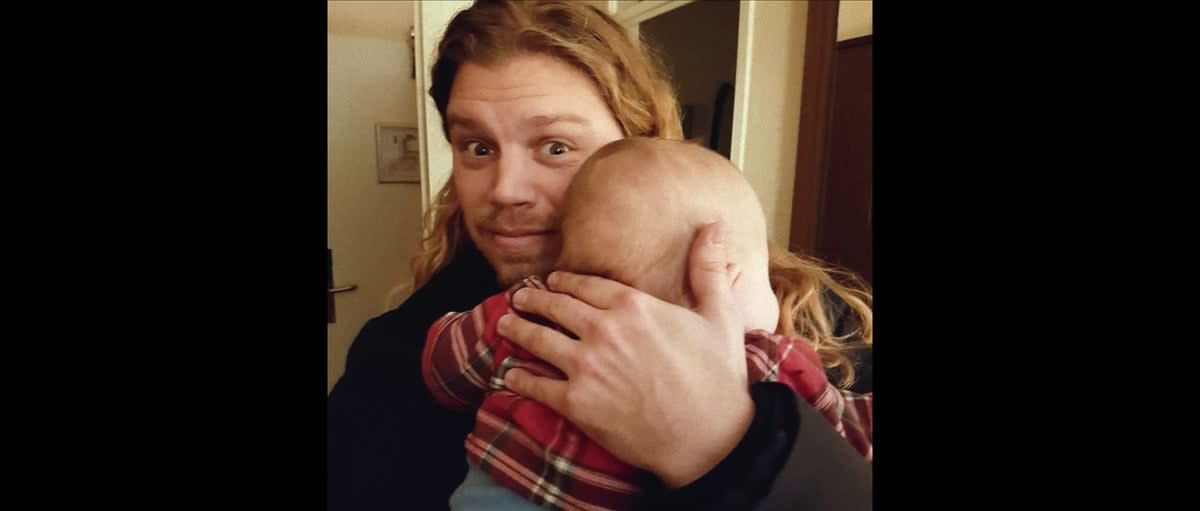The Man with 1000 Kids: the 'twisted' true story of a serial sperm donor and the parents out to stop him

Even though she hadn’t met the right guy, Vanessa decided that, aged 34, the time was right to start a family. On seeking a sperm donor, she found the clinic prices were prohibitive and looked for cheaper routes online.
On one website called Desire for a Child, she came across the profile of Jonathan Meijer, a thirtysomething Dutch musician who said he had signed up to donate after seeing his own friends struggle to conceive.
Vanessa found Meijer online, and watched videos of the good-looking, strawberry-blond, long-haired man playing songs and talking about travel and philosophy on his YouTube channel. She reached out to Meijer, who replied.
He was open to having a relationship with her future kids if they wanted (in the Netherlands, donor-conceived children can find out their parents’ identities after 16, in the UK it’s 18). They met at a central station – Vanessa chose a public place for safety reasons – where they spoke for an hour, and he seemed perfectly normal.
He told her that their child would be his eighth. Vanessa was happy with her choice, and the two made their exchange (Vanessa inseminated herself in the car, worried the sperm wouldn’t keep).
What followed was a nightmare. What Vanessa did not know when she paid €165 (£140) for Meijer’s sample and travel costs, was that he was a serial sperm donor who had potentially fathered hundreds of children around the world.
Now the story of Meijer’s actions is being told in a three-part Netflix docuseries, landing on this streamer today. The series, which the Standard has described as “a story to chill the blood” includes interviews with Vanessa, other mothers, a lawyer and a campaigner who help unpack the outrageous tale.
“We didn’t think that this could get any more twisted,” says one of the interviewees in the show’s trailer. “But it did.”
Vanessa’s horror

It was two years later, while Vanessa was trying to find Meijer again in order to conceive a second child, that she started to discover the extent of his antics. She had given birth to a daughter and wanted her next child to be a full sibling.
But while on a Dutch Facebook group for single mothers, she found out that her daughter was far from being Meijer’s eighth child. One woman she spoke to on the site told her that the Dutch Ministry of Health, Welfare and Sport had investigated Meijer and found he had produced at least 102 children in the Netherlands alone. Vanessa was dumbfounded.
“I really struggled with what to do,” she said to The Guardian. But Vanessa still went ahead with contacting Meijer. Once again they met, she paid him his fee, and he handed over a specimen jar. But she also confronted him about his many donations.
“He said, ‘I’m just helping women make their biggest wish come true,’” Vanessa said to The New York Times. “I said: ‘You’re not helping anymore! How do I tell my kids that they could possibly have 300 siblings?’”
In another interview, Vanessa said he replied: “Why are you surprised? If I’d been honest with you, would you have chosen me?” He allegedly admitted to having donated the sperm for 175 children, acknowledging there could be more.
Vanessa was furious: she had accepted that there may be dozens of half-siblings for her children. But he was seemingly owning up to hundreds – and the risk of incest could become an issue in the future.
She notified the Dutch Donor Child Foundation, who were already aware of Meijer – other mothers had reported him. And things intensified from there as Vanessa met (and later befriended) more women who had used Meijer’s sperm.
Some of the stories are quite astonishing: two women who worked together at a preschool noticed their kids looked similar and so shared their pregnancies stories – with dawning horror. They themselves knew other women in the same city – Almere, which is 30 minutes from Amsterdam and has a population of nearly 200,000 – whose children were also Meijer’s.
“It’s disgusting and I want it to stop,” said one of the mothers. “It’s dangerous for the children. There are more brothers and sisters in Almere, and they can fall in love. It’s not good.”
That same year Meijer was banned from donating sperm in the Netherlands. A court in the Hague told him to provide a list of the clinics he had donated to so that they could get rid of his sperm and he was banned from advertising his services in the country.

"All these parents are now confronted with the fact that the children in their family are part of a huge kinship network, with hundreds of half-siblings, which they did not choose," said The Hangue’s district court.
But it was far too late. Meijer had been donating his sperm since 2007, including outside of the country – and had apparently fathered around between 550 and 600 children. At one point, said a Dutch Donor Child Foundation volunteer who had been tracking Meijer’s movements, he had eight online profiles in Germany, Italy and the Netherlands. One said he was a “musical Viking donor.”
This same volunteer said she had been in contact with families from around the world who had been duped by Meijer: he now has kids in countries including Mexico, the US, Serbia, Australia and Romania. The director of the foundation, Ties van der Meer, says Meijer could have as many as 1,000 children.
Some of the families involved galvanised, joining together to try and stop the serial donor. One Dutch lawyer, Tim Bueter, said he had been contacted by 12 mothers – but given there were no real laws that prohibited Meijer’s actions, there was not much he could do to help. “It was stunning to hear that something like this is going on,” said Mr. Bueter to the NYT. “The only thing these women can do is go to the public and hope everyone in the world knows not to use this guy as a sperm donor.”
Meijer was taken to court again in 2023, this time by the Dutch Donor Child Foundation. The court said it prohibited “the defendant from donating his semen to new prospective parents after the issuing of this judgment” and said he would be fined €100,000 (£88,000) for every new donation.
Lawyer Mark de Hek said: “It is the first time that a judge has ruled on such a case and it is encouraging to see this behaviour immediately dealt with.”
The sperm bank problem
The number of children conceived via sperm donation globally is unknown, but according to the the UK’s regulator, the Human Fertilisation and Embryology Authority (HFEA), egg, sperm and embryo donations now account for 1 in 170 of all UK births and as many as 70,000 donor-conceived children have been born in the UK since 1991 (1978 saw the first child created via in vitro fertilisation). More specifically, in the UK in 2019, 2,800 children were conceived using sperm donation (out of 640,370).
Sperm donation laws vary by country, but regulated clinics often have a cap on how many children one donor can create (in the Netherlands it’s 25 children in 12 families; in the UK it’s capped at 10 families but no limits on how many children one family can have; in the US there are no legal limits, only guidelines). Plus there are stringent tests the sperm must go under before it is deemed viable.
In a November 2022 report, HFEA, working with the world’s largest sperm bank – Denmark’s Cryos International – found that of the 11,700 men who applied to be sperm donors in 2020, 17.41 per cent were rejected because of health issues, such as carrying a genetic or infectious disease. Another 11.71 per cent failed to prove a healthy enough lifestyle in a screening questionnaire, and the sperm of another 11.20 per cent of donors was rejected because its quality wasn’t good enough.
Meijer allegedly also had a profile registered with Cryos. In 2019 the company allegedly wrote to a woman who used Meijer’s sperm (who had worked out his real name), notifying her that her anonymous donor had “allegedly achieved more pregnancies than the pregnancies registered in our system” and that they had since ceased issuing his sperm.
Nevertheless, regulated, private clinics are still often the best option. But they are undoubtedly costly and regulated sperm donor waitlists can in some cases be as long as several years, so some women have tried to cut corners, turning to unlicensed clinics or websites, using unregulated donors. This gap in the market has created space for characters like Meijer – and he is not the only one.

Take 41-year-old Brit Simon Watson who made headlines in 2016 when he said he had donated once a week for 16 years, charging £50 a pop.
"Usually one [baby] a week pops out. I reckon I've got about 800 so far, so within four years I'd like to crack 1,000," he said on the Victoria Derbyshire programme that year. "I've got kids all the way from Spain to Taiwan, so many countries. I'd like to get the world record ever, make sure no-one's going to break it, get as many as possible."
Laura Witjens, chief executive of the National Gamete Donation Trust said: “If you strip it down to bare facts, you have a man who for whatever reason feels they need to impregnate over 500 women, you have women who are comfortable knowing their children have 500 half siblings, in another setting people would be appalled. They would ask questions, find it very disturbing."
There are now people who have built businesses around sperm donation: sperm donation enthusiast Adam Hooper hosts the podcast Sperm Donation World and runs an Australian sperm donor website which has as many as 16,000 members – leading to about 4,000 births since 2015 he estimates.
Last year he guessed he had 25 children. “I think I’ve got a couple on the way at the moment,” he said to The Guardian last year. “I had two babies born last week.” Similar businesses are booming around the world.
Meijer’s case comes as a blaring example of why international regulation around sperm donation is in need of an immediate, radical update: “The lack of any regulatory and legislative bodies for the international fertility industry lets companies claim and do whatever they want,” said Dutch Donor Child Foundation chairman Ties van der Meer. “We need international legislation and help for all families that have been hurt by the actions of donors like this man.”
After several high profile sperm donor cases, including Meijer’s, have come to light in the Netherlands, the government moved to build a central registry for sperm donors – it is not yet clear whether this is up and running.
“The big question is why?” said Donor Offspring Europe member, lawyer Christina Motejl. “These men want confirmation that they’re a great guy and everybody wants them.”
Meijer’s response
In an email to the New York Times, printed in a 2021 article, Meijer said: “I have approximately 250 children. Assumptions of 1,000 are ridiculous. I am disappointed by the obsession of the numbers. I became a donor not for any numbers but out of love to help parents with realising their dream. I cannot understand how anyone can only focus on numbers and see my donor children as a number.”
In another email to the NYT he said: “I know people are quickly judging me or thinking that I donate for narcissistic reasons. But I am quite down to earth about myself and I don’t think too highly about myself. (I prefer to be honest to myself and see my shortcomings and my good sides.) But what motivates me as a donor is just to do something really big with just a little bit of help, the appreciation of the recipients and the warm feelings and memories I share with the children and the recipients.”
Meijer has also now published several videos on his YouTube channel, including ‘Why did I became a Spermdonor?’ and ‘How much money gets a Spermdonor?’ in February, ‘The Sperm DONOR that helped 225 families receive 550 children!’ in June and ‘MY RESPONSE to the MISLEADING TRAILER of #themanwith1000kids’ published this week.
In the latter, he begins the 16-minute video by saying: “Of course, the title is misleading. Absolutely one big lie. I have helped with 550 children. 100 in the Dutch clinics, 450 privately, they could be some more – I estimate 50 – from the Danish sperm bank Cryos. So from the start, already deceptive, already lying, and I think it would make a good legal case to sue them for slander or something.”
The Man with 1000 Kids becomes available on Netflix on July 3


